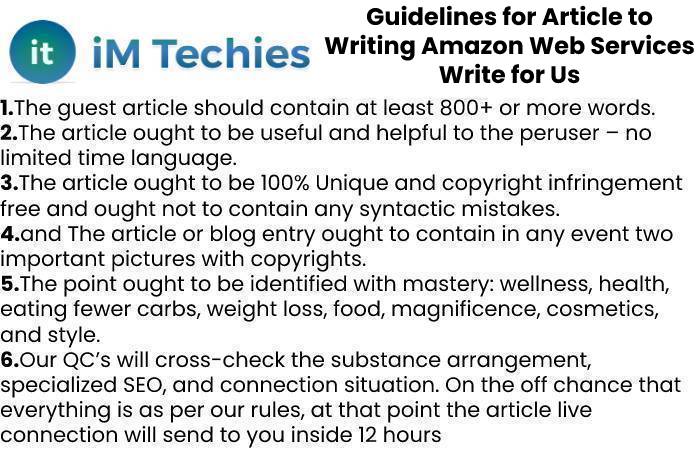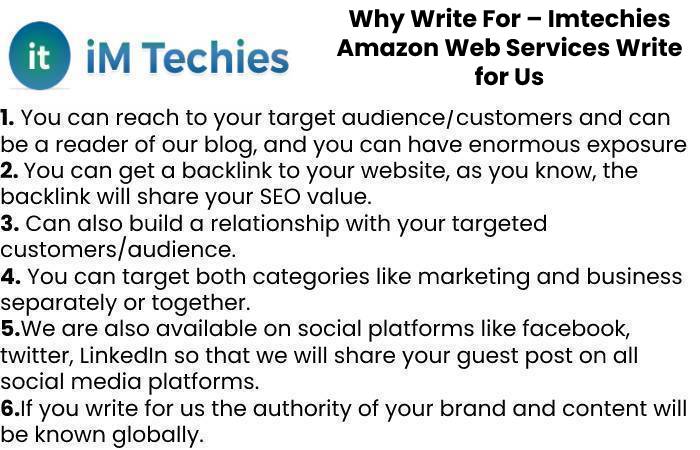
Amazon Web Services Write For Us
Amazon Web Services, Inc. (AWS) is an Amazon subsidiary that provides on-demand cloud computing platforms and APIs for individuals, businesses, and governments with a distributed pay-as-you-go system. These cloud computing web services offer many underlying abstract technical infrastructures and distributed computing components and tools.
One such service is Amazon Elastic Compute Cloud (EC2), which allows users to have an accessible virtual machine cluster that is always accessible over the Internet. AWS VMs mimic most of the attributes of a real computer, including hardware central processing units (CPUs) and graphics processing units (GPUs) for processing; RAM / local memory; HDD / SSD; choice of operating systems; networks; and preloaded application software such as web servers, databases, and customer relationship management (CRM).
AWS technology is deployed on server farms around the world and is supported by a subsidiary of Amazon. And also, Pricing is based on a combination of usage (called pay-as-you-go), hardware, operating system, crm software blog, or network features selected by the subscriber, required availability, redundancy, security, and service options.
Subscribers can pay for one AWS VM, dedicated physical machine, or clusters thereof. Under a subscription contract, Amazon provides security for subscriber systems. Therefore, AWS operates in many geographic regions around the world, including 6 in North America.
What are Amazon Web Services?
Amazon Web Services, also identified as AWS, is a suite of Amazon cloud computing tools and services. The service was officially launched in 2006, And also, as of June 2007, AWS had approximately 180,000 users. Companies that use it include Reddit, Foursquare, Pinterest, Netflix, NASA, or the CIA, and some Spanish companies like Map free, FC Barcelona, or Inter flora. It is mainly due to the adulthood of the service compared to similar services and capabilities offered by the wide range of tools available. Therefore, Cloud Computing Guide reaches all Amazon Web Services tools with devices from other similar platforms.
Amazon Web Services Tools
Therefore, general trend of cloud platforms is to offer as many tools and services as possible to create a complete IT environment in a cloud. Like other platforms like Microsoft Azure, Amazon has various tools to manage multiple elements within the business. AWS is ready for freelancers such as small and medium businesses or large enterprises, with the ability to scale your instances or storage as your business grows.
Amazon Web Services offers tools in the following categories:
Cloud computing is all you need to build, maintain, or scale. Amazon EC2 is the undisputed king of Amazon cloud computing services.
Databases: Different databases can stay in the cloud using Amazon RDS, with various styles to choose from, such as B. And also, MySQL, PostgreSQL, Oracle, SQL Server, and Amazon Aurora or Amazon DynamoDB for NoSQL.
Virtual Network: This allows you to create VPNs in the cloud, largely thanks to the Amazon VPC service.
Business Applications: Amazon Work Mail is a business email service offered by Amazon to which other services such as Amazon Work Docs and Amazon Work Spaces can connect.
Storage and content manager: different types of storage, both for files with regular access and rare files or in archive form. Amazon S3 is the leading service, although other services like Amazon Glacier or Amazon EBS round out the offering. In the following video (12:13 min.), You can see a video tutorial with a general definition of AWS and an explanation of how Amazon S3 works:
BI or Business Intelligence (BI): Analyze business systems for big data and other data flow management services.
Mobile app management: Tools like Amazon Mobile Hub let you manage, And also, build, test, and deploy mobile apps from the cloud.
Internet of Things (IoT): to establish a connection and analyze all devices connected to the Internet and their collected data.
Development tools: To store code, deploy it automatically, or even publish software in continuous delivery.
Security and Access Control: Authentication can be implemented in several steps to secure access to your internal systems, whether they are installed in the cloud or locally in your office.
How to Submit Your Articles
For Submitting Your Articles, you can email us contact@imtechies.com
Why Write For – Imtechies Amazon Web Services Write for Us
Search Terms Related to Amazon Web Services Write For Us
- Amazon Elastic Compute Cloud (EC2)
- Amazon Simple Storage Service (S3)
- Amazon Relational Database Service (RDS)
- Amazon DynamoDB
- Amazon Lambda
- Amazon Virtual Private Cloud (VPC)
- Amazon Elastic Block Store (EBS)
- Amazon Route 53
- Amazon CloudFront
- Amazon Simple Queue Service (SQS)
- Amazon Simple Notification Service (SNS)
- Amazon Elastic Load Balancing (ELB)
- Amazon Glacier
- Amazon CloudWatch
- Amazon Kinesis
- Amazon Redshift
- Amazon Elastic Container Service (ECS)
- Amazon Elastic Kubernetes Service (EKS)
- Amazon Aurora
- Amazon Polly
Search Terms for Amazon Web Services Write For Us
- Amazon Web Services guest posting
- Write for us AWS
- AWS guest contributors wanted
- AWS blog submission guidelines
- Contribute to AWS blog
- AWS guest author guidelines
- Submit guest post AWS
- AWS content contributors
- AWS article submission
- Write for AWS community
- AWS guest blogging opportunities
- AWS blog writer wanted
- AWS guest post pitch
- AWS guest blogging guidelines
- Amazon Web Services contributor program
- AWS technical writing opportunities
- AWS developer blog submission
- AWS thought leadership submission
- AWS content creator opportunities
- AWS blog contributor application
Guidelines for Article to Writing Amazon Web Services Write for Us

For Submitting Your Articles, you can email us contact@imtechies.com

